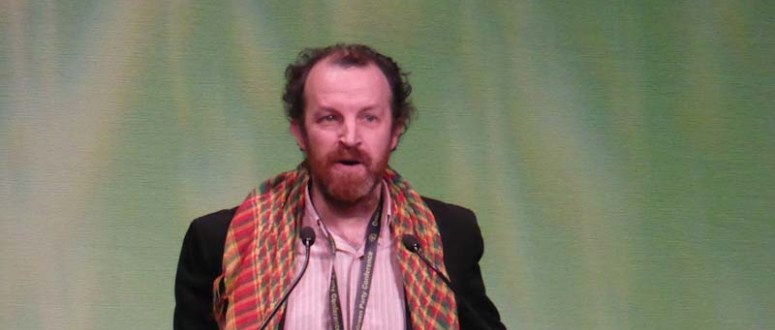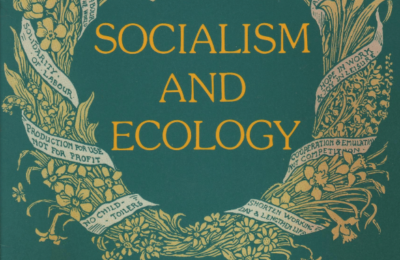Terry Conway for RedGreen Labour interviewed ecosocialist activist and writer Derek Wall in the first of our series of pieces for 2019
RGL: You have been involved in environmental politics in one form of another for a long time. What was the original trigger that got you involved?
DW: I first became interested in green politics in 1980, at the tender age of 14. The wave of environmental concern in the 1970s saw the creation of green parties and new environmental movements. This was often framed around arguments about economic growth. The Limits to Growth report and Blueprint for Survival were published, arguing that economic growth was ecologically unsustainable. This feed into popular culture, I think I picked up some of this from television, I was an avid watcher as a child and teenager. Animal rights campaign also influenced, me, for example, the emotive campaigns against whaling, the Orkney seal cull and the Japanese dolphin hunts.
A particular trigger was going along to an Ecology Party meeting, held next door to where I lived. The dramatic framing of ecological disaster by the speaker in the Old School House, at the Alms Houses, in Corsham in Wiltshire, got me interested.
So I joined the Ecology Party, which later became the Green Party. I have been active pretty much ever since, until recently in party politics, but in many other ways as well, including direct action.
RGL: You are both an activist and a prolific writer on themes around ecosocialism. How do you see the relationship between the two – both for you personally and for the movement more generally.
DW: There needs to be relationship between ideas and action. Even where people are aware of climate change and want to take action, this isn’t enough to be effective. Writing helps develop, hopefully, clearer ideas about how we can make change. One thing I am quite dogmatic about is that, given the urgent and potentially devastating nature of climate change and other ecological problems, we need to think carefully and strategically.
On a personal basis, I love writing and I am an obsessive reader. My basic concern is how to make environmental or green politics strategic and effective. This has taken me in diverse directions, some of which I have outlined in this piece: https://entitleblog.org/2015/07/24/green-politics-a-personal-account-of-some-texts-and-contexts/
An important task has been writing about Elinor Ostrom. She was the first and so far only woman to win a Nobel prize in economics. Her work was all about commons (collectively owned fields, forests, fisheries, etc), ecological problems and the promotion of a feminist, environmental and sharing economy.
Ecosocialism has been an area too of continuing interest. Capitalism is based on short term need and ever-increasing economic growth, so we need a practical alternative. In the past, much socialism has been unecological but the development of green forms of socialism, has continued to really inspire me. The discovery of ecological ideas at the heart of Marx and Engels work in books like Marx’s Ecology, along with the publication of ecosocialist manifestos like the late, great Joel Kovel’s The Enemy of Nature, has been important to my activism.
RGL: You were for many years a leading member of the Green Party but left over a year ago. You have not joined the Labour Party though I believe you like a lot of what Jeremy Corbyn stands for – especially on international and environmental questions. How would you describe your politics today? How would you describe your attitude to Labour under Corbyn?
DW: I am not primarily focussed on party politics at present. I have not left the Greens because of any sharp disagreement but I do think the election of Jeremy Corbyn as Labour leader in 2015, has long term implications for Green politics. Put simply, Labour in the past, even as Old Labour, before Tony Blair, was very distant from the politics I am passionate about.
Britain is still a bit feudal, while Labour governments have done some brilliant things, where would be without the NHS, for example, they also been shaped by a politics that is bit top down and paternalistic. Labour was traditionally on far from environmentally focussed, this all seems to be changing.
Both Jeremy Corbyn and John McDonnell are keenly aware of ecosocialist politics. They really built links with the left outside Labour including the left of the Green Party when they were back benchers. Jeremy Corbyn was kind enough to be a guest speaker, along with Hugo Blanco the Peruvian ecosocialist, at the book launch for my book on ecosocialism ‘The Rise of the Green Left’. In turn, John has read and endorsed my most recent book on Elinor Ostrom. So I have a personal connection and bias.
Its not just me. Jeremy and John held Peoples Parliament meetings in Westminster, getting the likes of greens like Caroline Lucas and Molly Scott-Cato to debate economic growth and other themes. Both have been supporters of the trade union climate change campaign.
Labour has some way to go, and politics is always limited by circumstances. Moving the party in a more democratic and ecosocialist direction is an important task, however while I am strongly supportive of this, having been a member of another party for 38 years I am probably not best to help with this.
I hope the Green Party and the Labour Party can cooperate. Party politics makes this difficult but in the early 1980s SERA, the Labour Party’s environmental network, helped do excellent cross-party work. Incidentally their magazine New Ground and their publication of Ecosocialism in a Nutshell, were part of my political education.
RGL: One strand of your ecosocialism which is relatively unusual, especially on the British left, is your fierce internationalism. Can you tell us more about your support for the Kurdish struggle – but also for that of indigenous communities in the Andes and your relationship with Hugo Blanco?
DW: Well Hugo Blanco is perhaps the most inspiring and practical ecosocialist leader we have, he led an uprising of indigenous people back in the 1960s and was praised for doing so by Che Guevara. Remarkably at the age of 84 he is still very active. The ecological crisis will be won or lost in the Amazon, supporting the indigenous people fighting to preserve it should be an absolute priority for all of us who care about climate change. The election of Jair Bolsonaro, in Brazil, an essentially fascist leader who has targeted the indigenous primarily because of their defence of the Amazon, shows the importance of Hugo’s work.
Ecological politics is about serious and focussed international campaigning. As an International Coordinator of the Green Party, I was very involved in this.
The story of the Kurds in Rojava, (the west), is remarkable and also extremely complex. They are attempting to build an ecological, democratic and feminist society in very difficult circumstances.
They are inspired by the historic leader of the revolutionary Kurds, Ocalan, who was kidnapped and is now in solidarity confinement in Turkey. Another key thinker for the revolutionary Kurds is the green anarchist social ecologist Murray Bookchin. I met, organised a speaking tour and like most others on the green left, fell out with Bookchin. Nonetheless his ideas are having a material and over strikingly positive effect. All serious red-greens should read and learn from him, his partner Janet Biehl wrote a useful biography of him, which incidentally I have reviewed {https://greenworld.org.uk/article/ecology-or-catastrophe-life-murray-bookchin}.
Jeremy Corbyn is a long-term supporter of the Kurds, and a patron of Peace in Kurdistan. In contrast, Theresa May is their implacable enemy, working to sell more weapons to the increasingly dictatorial Turkish leader Erdogan, who has vowed to invade and destroy Kurdish Rojava. Like so many things, the British media, including the Guardian, largely ignore really essential debates on these and many other critical questions for ecosocialists.



